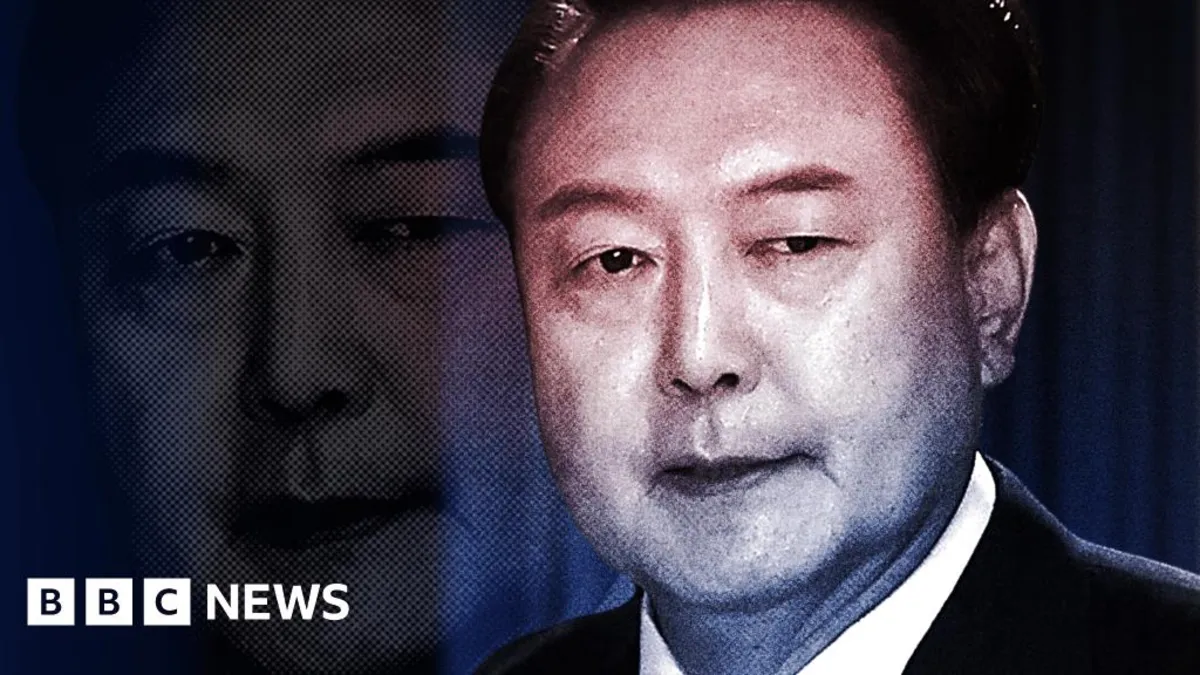
In a shocking decision, South Korea's Constitutional Court ruled on Friday that President Yoon Suk Yeol had abused his power by declaring martial law last December, resulting in his permanent removal from office. This ruling has sent ripples through a nation that has long been celebrated as a peaceful democracy, renowned globally for its K-dramas and technological advancements. Yoon's declaration of martial law, which involved military control, stunned not only South Koreans but also world leaders, leaving many to wonder: What was he thinking?
Yoon's abrupt decision to impose martial law is attributed to a significant underestimation of resistance from the public, military, and members of parliament. After just six hours, he rescinded the order. To understand the motivations behind this unprecedented move by a once-respected prosecutor, the BBC interviewed those closest to Yoon – including friends, confidantes, and political aides. Their insights reveal a complex character driven by a strong belief in justice, yet prone to impulsive decisions that ultimately led to the downfall of his presidency.
From a young age, Yoon was fiercely competitive, as recounted by his childhood friend, Chulwoo Lee. Yoon's determination to succeed was evident even in primary school, where he was described as the largest boy in class, often sitting at the back to avoid obstructing others' views. Contrary to the narrative that he struggled academically, Mr. Lee emphasized Yoon's intelligence and popularity among peers.
Yoon attended college during a tumultuous period in South Korea's history, marked by the military dictatorship of Chun Doo-hwan. The infamous Gwangju massacre, where military forces killed protesting civilians, was a pivotal moment that shaped Yoon's beliefs. While he was not actively involved in the student protests, he exhibited a strong sense of justice, famously confronting plainclothes police who were interrogating a girl on campus. His temper, however, was often uncontrollable, reflecting his passionate nature.
As a state prosecutor, Yoon earned a reputation for his unyielding commitment to justice. However, his aggressive approach raised concerns among colleagues, including Mr. Lee, who noted that Yoon's investigations became increasingly combative. His defiance against political pressure, particularly in a high-profile corruption case involving the intelligence service, solidified his image as a fearless prosecutor. Yoon's declaration during a testimony that he owed loyalty to no one resonated with the public, further bolstering his reputation.
In 2018, Yoon prosecuted former President Park Geun-hye, which endeared him to many on the left. However, his non-partisan stance soon became a double-edged sword as he launched investigations into figures in the left-leaning government. This led to a rift with Mr. Lee, who cautioned Yoon about crossing a line from which there was no return. Their friendship suffered, with Yoon's dogged pursuit of justice alienating potential allies. Despite this, his principled approach garnered him significant support from the public.
Despite his lack of political connections, Yoon decided to run for president. His close friend, Shin, reflected on their brainstorming sessions, expressing concerns about Yoon's political isolation. After being selected as the candidate for the conservative People Power Party, Yoon's political views swiftly shifted to the right. Influenced by right-wing politicians and media, he began to adopt an increasingly hostile stance towards the opposition, convinced they had ties to North Korea.
As Yoon's political strategy evolved, his campaign strategist, Kim Keun-sik, expressed regret over endorsing Yoon, describing him as stubborn and impulsive. Yoon's refusal to listen to advice from seasoned political aides and his inclination to make decisions based on personal relationships rather than sound strategy ultimately led to his downfall. Despite being seen as a risk, Yoon's initial appeal compelled the party to rally behind him.
Once in office, Yoon's confrontational style alienated many moderate voters and set the stage for conflict with the parliamentary opposition. His prosecutorial instincts, which had served him well in the courtroom, hindered his ability to govern effectively. An anonymous aide noted that Yoon was dismissive of alternative viewpoints and resisted calls for dialogue with the opposition. His fixation on fighting rather than collaborating would prove detrimental.
Yoon's administration faced significant backlash from the public, particularly after his wife accepted luxury gifts, which fueled discontent. Despite the mounting dissatisfaction, he remained steadfast in his belief that his policies would eventually be recognized as beneficial. His arrogance in dismissing public opinion was highlighted as a major miscalculation, leading to a significant defeat for his party in parliamentary elections.
In the aftermath of his party's electoral loss, Yoon's mindset shifted dramatically. His interactions with far-right media and conspiracy theories exacerbated his paranoia about the opposition. He viewed them as a direct threat to democracy, leading to the fateful decision to declare martial law on December 3. This drastic measure was seen as an attempt to punish his political adversaries and maintain control over a rapidly deteriorating political landscape.
Chulwoo Lee articulated the irony of Yoon's actions, suggesting he had convinced himself that he was saving the nation from a communist threat. Yet, many view his attempts to impose martial law as a reckless and misguided effort that jeopardized South Korea's democratic foundations. Yoon's journey from a principled prosecutor to a controversial president serves as a cautionary tale about the dangers of power and the importance of accountability in governance.